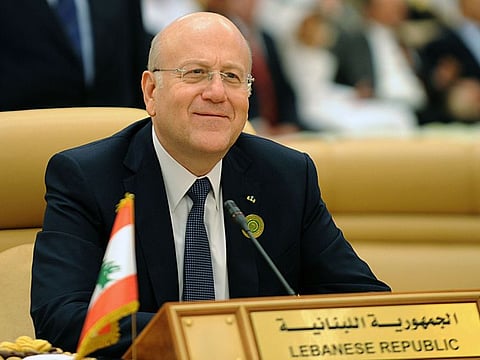Lebanon’s richest man indicted. Who is Najib Mikati?
Former Lebanese premier denies charges, says indictment is politically motivated

Beirut: A state prosecutor accused former prime minister Najib Mikati - Lebanon’s richest man - and the country’s biggest bank of making illicit gains from a subsidized housing program, in the first corruption case filed since anti-government protesters took to the streets a week ago.
Hundreds of thousands of Lebanese have filled the streets nationwide in the past week, taking aim at a political elite they blame for entrenched corruption and worsening living conditions.
The government presented an emergency reform plan Monday to avert financial crisis and appease the public, but the move has failed to quell the revolt.
More than 25 per cent of Lebanon’s population lives in poverty, according to the World Bank.
Who is Mikati and just how wealthy is he?
Mikati, 63, is a prominent Sunni politician and former prime minister. He has multiple business interests in West Africa and across the globe, in partnership with his brother Taha.
The former premier’s estimated wealth is $2.5 billion, making him among the world’s 1,000 richest people, according to Forbes.
Mikati and his billionaire brother - the two wealthiest men in Lebanon - co-founded the Beirut-based firm M1 Group, which has investments in telecommunications companies in South Africa, and other holdings in Monaco, London and New York.
They hail from Tripoli, which has some of the country’s highest poverty rates, and has witnessed some of the biggest protests.
What are the charges against him?
A state prosecutor has pressed charges against him over alleged corruption.
Mikati, 63, along with his brother, his son and a Lebanese bank have been accused of “illicit enrichment”, the National News Agency reported.
In 2018, Lebanese media reported that Mikati and his family members were accused of wrongly receiving millions of dollars in subsidised housing loans.
The loans were supposed to help low and middle-income Lebanese buy homes.
The government-backed scheme has subsequently stopped granting new loans.
Some demonstrators have raised signs calling for the housing loan programme to be revived.
What is the significance of the indictment?
Corruption is rife in Lebanon, but it is rare for politicians to face legal proceedings.
The illicit gains law in Lebanon criminalizes profits made through bribes or abuse of public office. The case against Mikati marks the first time it has ever been implemented, according to monitoring group Legal Agenda.
How has Mikati reacted to the charges?
He has denied the allegations, saying they carried a “message” and that he was “surprised” by the timing.
He said the charges were punishment for not supporting the election of President Michel Aoun in 2016 and for calling on the government to resign in the face of mass protests that broke out last week.
Bank Audi, which was accused of cooperating with Mikati, also emphatically denied the allegations in a statement carried by the NNA, denying “any activity related to illicit enrichment”.
Mikati added that he would be willing to lift banking secrecy on his accounts, a measure Aoun has suggested for high-ranking officials in response to demonstrators’ demands.
Lebanon has strict privacy rules for bank accounts, which critics say makes the country susceptible to money laundering.
Sign up for the Daily Briefing
Get the latest news and updates straight to your inbox



